CPS Unit Number 027-04
Camp: 27
Unit ID: 4
Operating agency: AFSC
Opened: 3 1943
Closed: 12 1946
Workers
Total number of workers who worked in this camp: 44
-
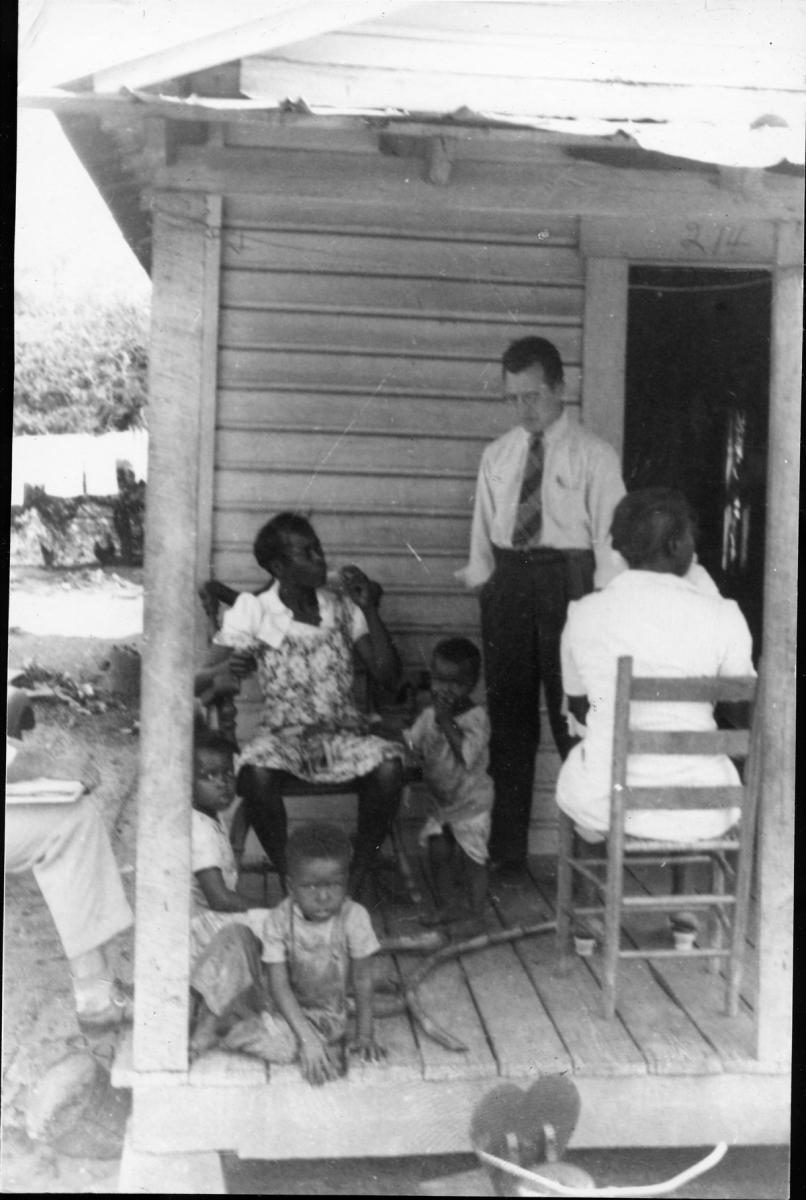 CPS Camp No. 27, Florida State Board of Health, Subunit 2, Mulberry, FloridaWilliam Yoder talks over sanitation problems with his friends on sanitation survey.Digital Image at Mennonite Church USA Archives, North Newton, Kansas
CPS Camp No. 27, Florida State Board of Health, Subunit 2, Mulberry, FloridaWilliam Yoder talks over sanitation problems with his friends on sanitation survey.Digital Image at Mennonite Church USA Archives, North Newton, Kansas -
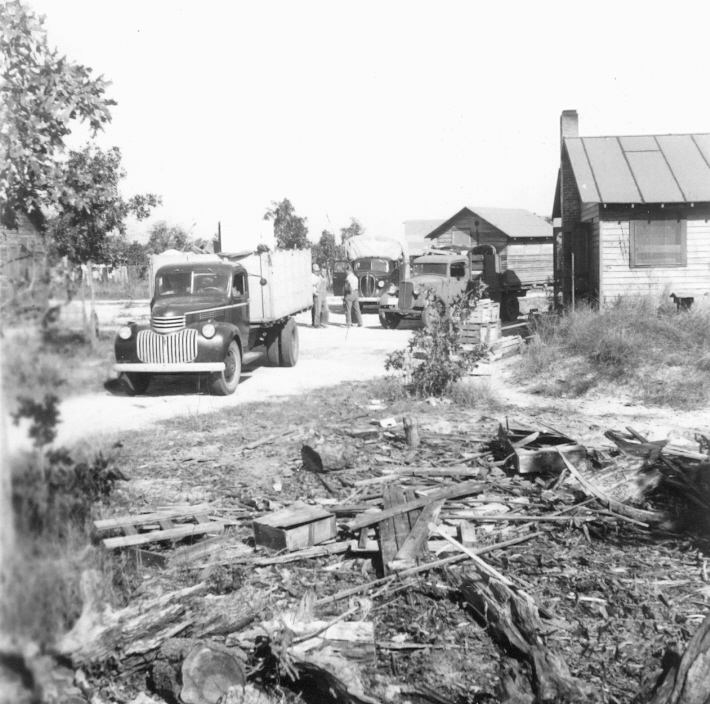 CPS Camp No. 27, subunit 1, Crestview Florida.Leaving Camp Crestview site Nov. 12, 1943.Digital Image © 2011 Brethren Historical Library and Archives. All Rights Reserved.Nov. 12, 1943
CPS Camp No. 27, subunit 1, Crestview Florida.Leaving Camp Crestview site Nov. 12, 1943.Digital Image © 2011 Brethren Historical Library and Archives. All Rights Reserved.Nov. 12, 1943 -
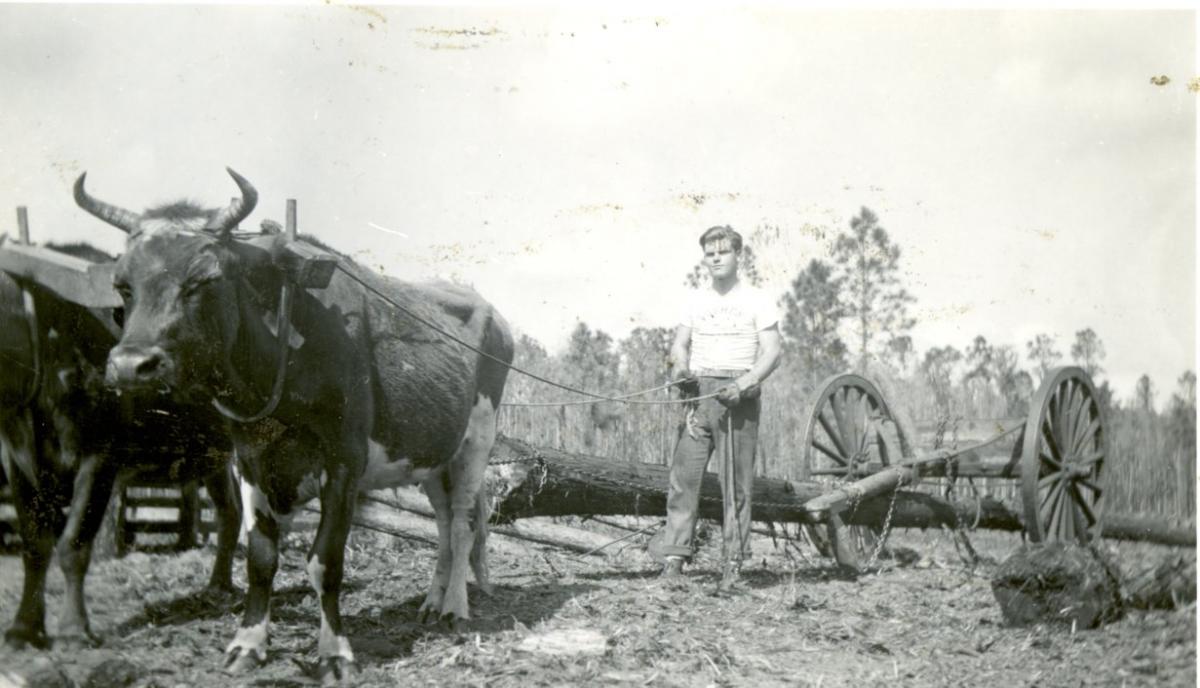 CPS Camp No. 27 Mulberry, FloridaCamp 27, Mulberry, Florida. The oxen and cart that drag many a log to the sawmill.Photo #47. Box 1, Folder 17. MCC Photographs, Civilian Public Service, 1941-1947. IX-13-2.2. Mennonite Central Committee Photo Archive
CPS Camp No. 27 Mulberry, FloridaCamp 27, Mulberry, Florida. The oxen and cart that drag many a log to the sawmill.Photo #47. Box 1, Folder 17. MCC Photographs, Civilian Public Service, 1941-1947. IX-13-2.2. Mennonite Central Committee Photo Archive -
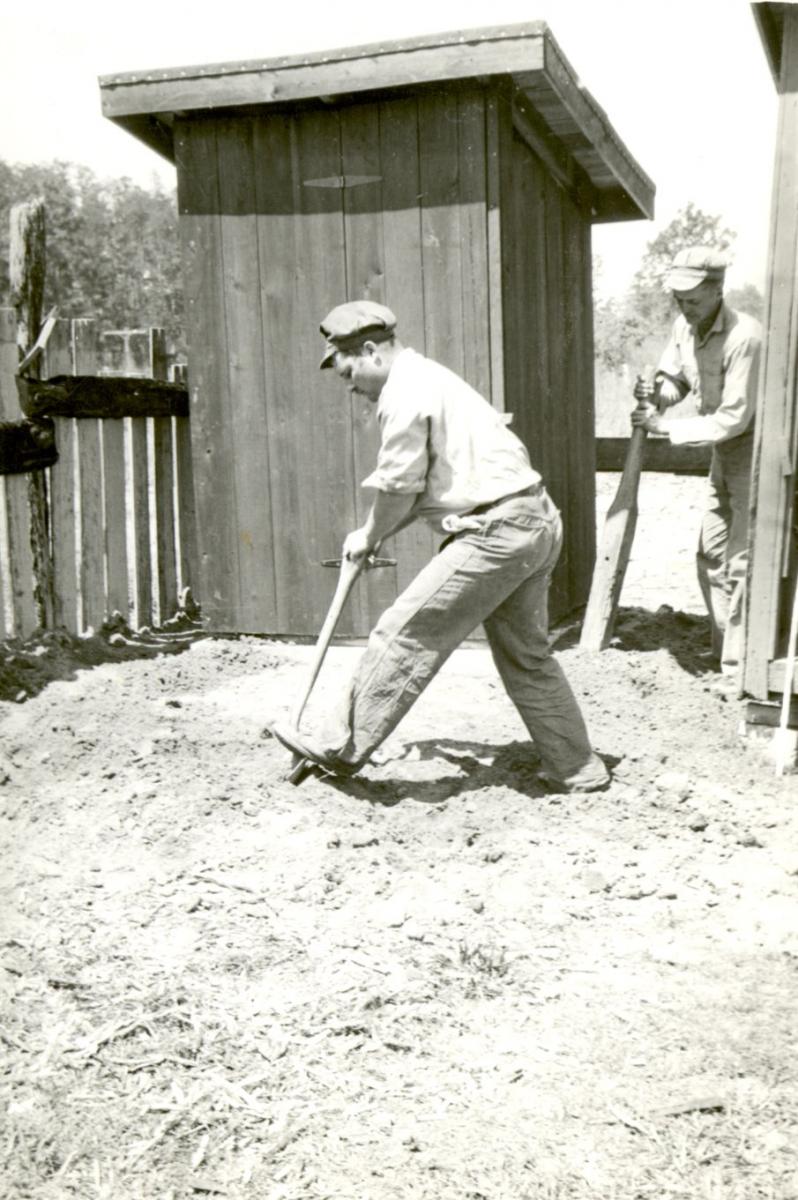 CPS Camp No. 27 Mulberry, FloridaCPS Camp No. 27, Mulberry, Florida. Ed Zehr and Pete Bartel leveling group around completed unit [sanitary privies].Photo #152. Box 1, Folder 17. MCC Photographs, Civilian Public Service, 1941-1947. IX-13-2.2. Mennonite Central Committee Photo Archive
CPS Camp No. 27 Mulberry, FloridaCPS Camp No. 27, Mulberry, Florida. Ed Zehr and Pete Bartel leveling group around completed unit [sanitary privies].Photo #152. Box 1, Folder 17. MCC Photographs, Civilian Public Service, 1941-1947. IX-13-2.2. Mennonite Central Committee Photo Archive -
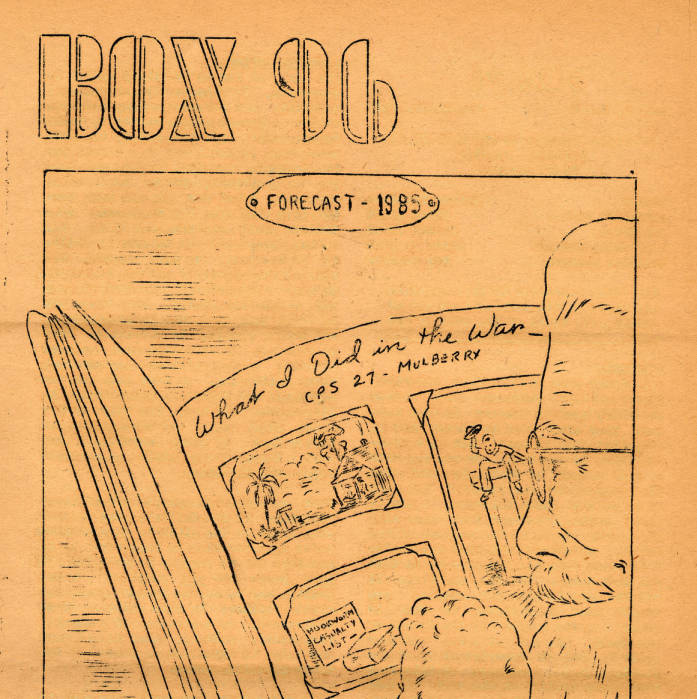 CPS Camp No. 27, subunit 2, Box 96Box 96 was a newsletter published by the men at Camp 27, subunit 2, from April 1944 to March 1945.Digital Image from American Friends Service Committee: Civilian Public Service Records (DG002), Swarthmore College Peace Collection, Swarthmore, Pennsylvania
CPS Camp No. 27, subunit 2, Box 96Box 96 was a newsletter published by the men at Camp 27, subunit 2, from April 1944 to March 1945.Digital Image from American Friends Service Committee: Civilian Public Service Records (DG002), Swarthmore College Peace Collection, Swarthmore, Pennsylvania -
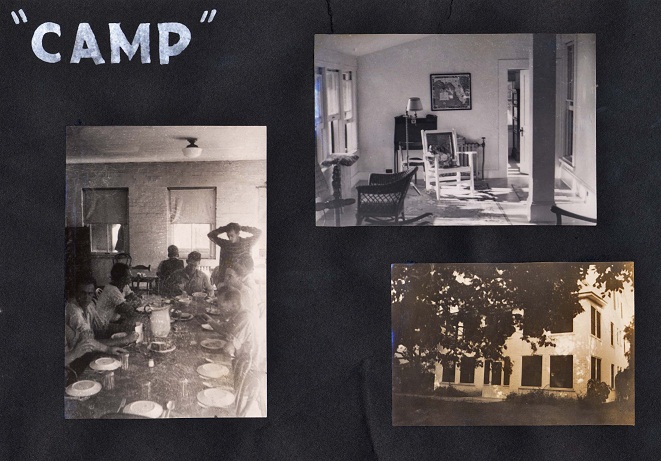 CPS Camp No. 27, subunit 4Photo album of Orlando, Florida, project, page #6.Digital image from American Friends Service Committee: CPS Records (DG002), Swarthmore College Peace Collection, Swarthmore, Pennsylvania
CPS Camp No. 27, subunit 4Photo album of Orlando, Florida, project, page #6.Digital image from American Friends Service Committee: CPS Records (DG002), Swarthmore College Peace Collection, Swarthmore, Pennsylvania -
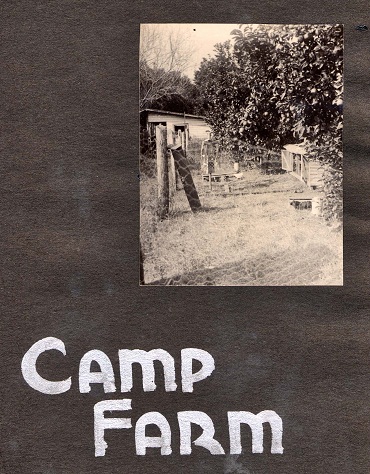 CPS Camp No. 27, subunit 4Photo album of Orlando, Florida, project, page #7.Digital image from American Friends Service Committee: CPS Records (DG002), Swarthmore College Peace Collection, Swarthmore, Pennsylvania
CPS Camp No. 27, subunit 4Photo album of Orlando, Florida, project, page #7.Digital image from American Friends Service Committee: CPS Records (DG002), Swarthmore College Peace Collection, Swarthmore, Pennsylvania -
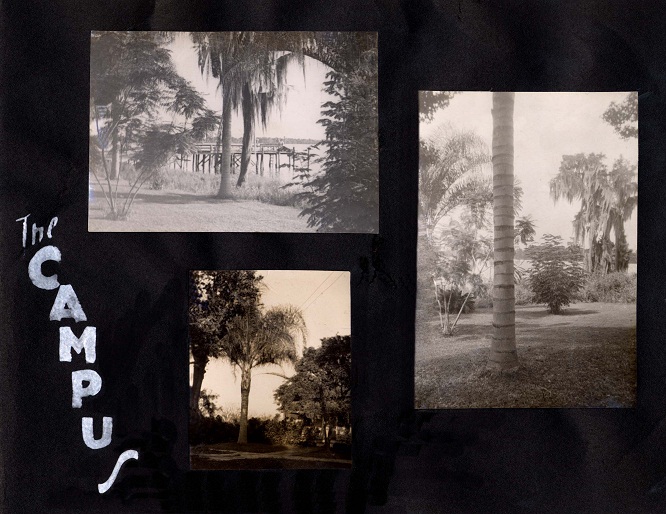 CPS Camp No. 27, subunit 4Photo album of Orlando, Florida, project, page #3. "The Campus".Digital image from American Friends Service Committee: CPS Records (DG002), Swarthmore College Peace Collection, Swarthmore, Pennsylvania
CPS Camp No. 27, subunit 4Photo album of Orlando, Florida, project, page #3. "The Campus".Digital image from American Friends Service Committee: CPS Records (DG002), Swarthmore College Peace Collection, Swarthmore, Pennsylvania -
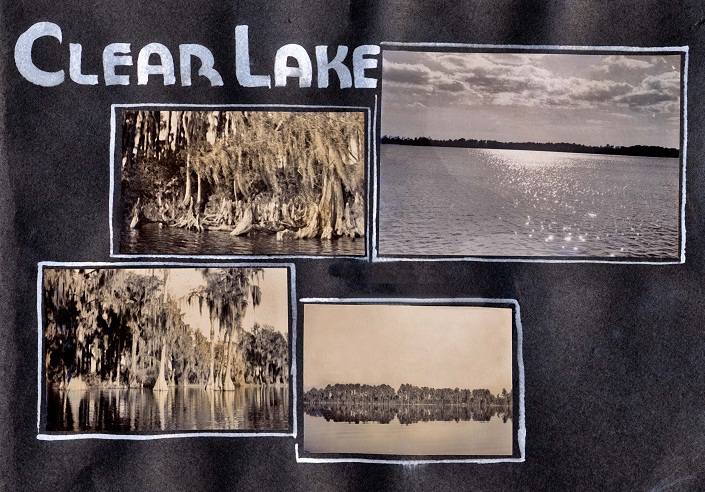 CPS Camp No. 27, subunit 4Photo album of Orlando, Florida, project, page #4. "Clear Lake".Digital image from American Friends Service Committee: CPS Records (DG002), Swarthmore College Peace Collection, Swarthmore, Pennsylvania
CPS Camp No. 27, subunit 4Photo album of Orlando, Florida, project, page #4. "Clear Lake".Digital image from American Friends Service Committee: CPS Records (DG002), Swarthmore College Peace Collection, Swarthmore, Pennsylvania -
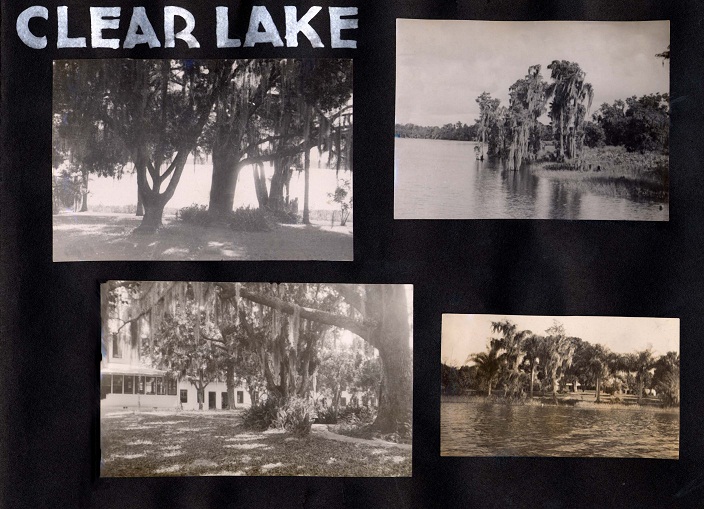 CPS Camp No. 27, subunit 4Photo album of Orlando, Florida, project, page #5. "Clear Lake".Digital image from American Friends Service Committee: CPS Records (DG002), Swarthmore College Peace Collection, Swarthmore, Pennsylvania
CPS Camp No. 27, subunit 4Photo album of Orlando, Florida, project, page #5. "Clear Lake".Digital image from American Friends Service Committee: CPS Records (DG002), Swarthmore College Peace Collection, Swarthmore, Pennsylvania -
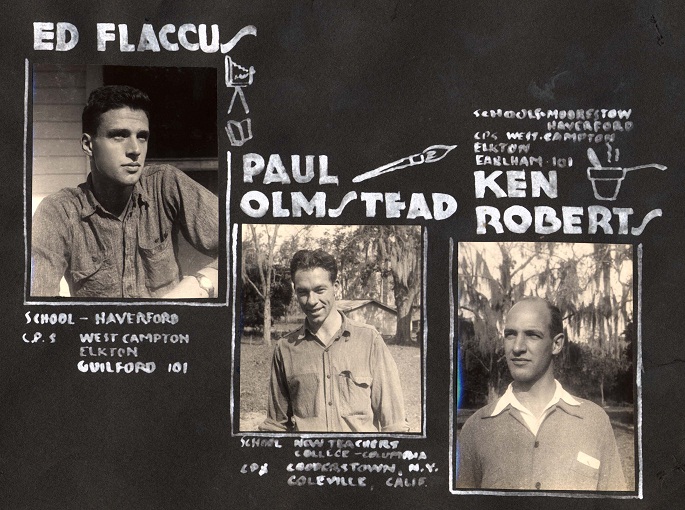 CPS Camp No. 27, subunit 4Photo album of Orlando, Florida, project, page #10. Edward Flaccus, Paul D. Olmstead, Kenneth S. Roberts.Digital image from American Friends Service Committee: CPS Records (DG002), Swarthmore College Peace Collection, Swarthmore, Pennsylvania
CPS Camp No. 27, subunit 4Photo album of Orlando, Florida, project, page #10. Edward Flaccus, Paul D. Olmstead, Kenneth S. Roberts.Digital image from American Friends Service Committee: CPS Records (DG002), Swarthmore College Peace Collection, Swarthmore, Pennsylvania -
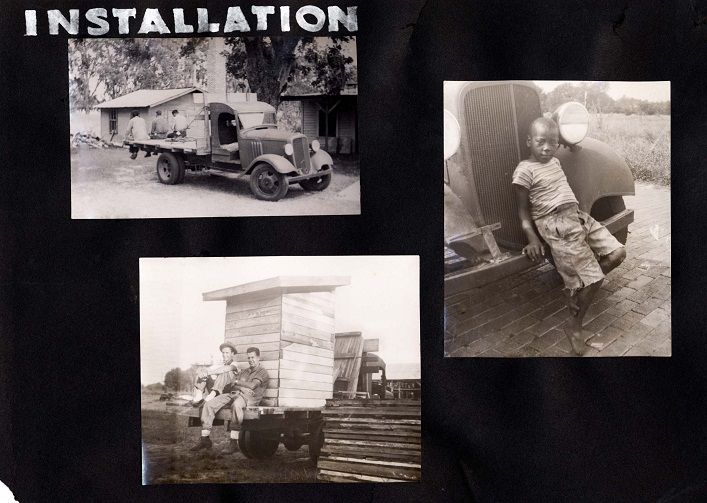 CPS Camp No. 27, subunit 4Photo album of Orlando, Florida, project, page #14. "Installation".Digital image from American Friends Service Committee: CPS Records (DG002), Swarthmore College Peace Collection, Swarthmore, Pennsylvania
CPS Camp No. 27, subunit 4Photo album of Orlando, Florida, project, page #14. "Installation".Digital image from American Friends Service Committee: CPS Records (DG002), Swarthmore College Peace Collection, Swarthmore, Pennsylvania -
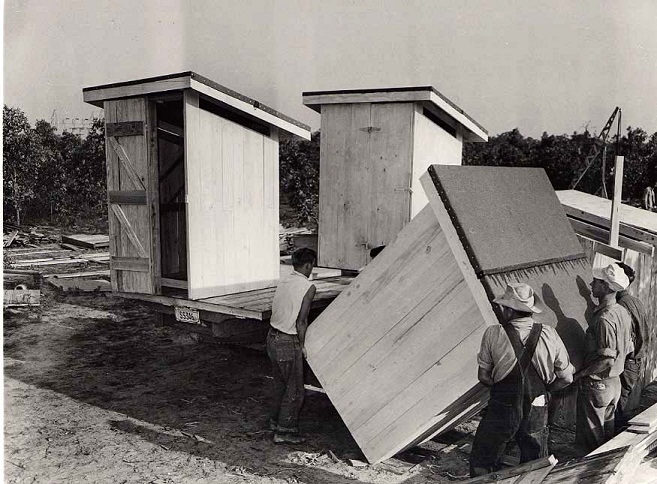 CPS Camp No. 27, subunit 4Loading latrines. Credit: Tony Garnet.Digital image from American Friends Service Committee: CPS Records (DG002), Swarthmore College Peace Collection, Swarthmore, Pennsylvania
CPS Camp No. 27, subunit 4Loading latrines. Credit: Tony Garnet.Digital image from American Friends Service Committee: CPS Records (DG002), Swarthmore College Peace Collection, Swarthmore, Pennsylvania -
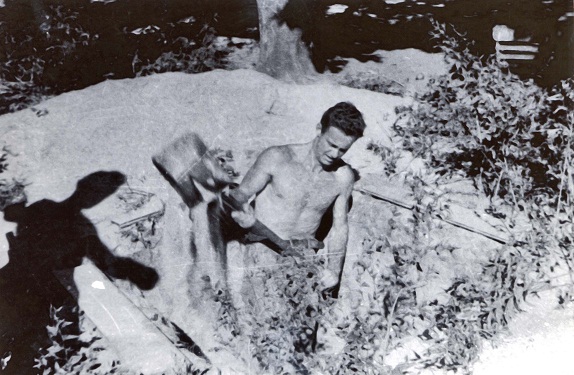 CPS Camp No. 27, subunit 4Agricultural work. Orlando, Florida.Digital image from American Friends Service Committee: CPS Records (DG002), Swarthmore College Peace Collection, Swarthmore, Pennsylvania
CPS Camp No. 27, subunit 4Agricultural work. Orlando, Florida.Digital image from American Friends Service Committee: CPS Records (DG002), Swarthmore College Peace Collection, Swarthmore, Pennsylvania -
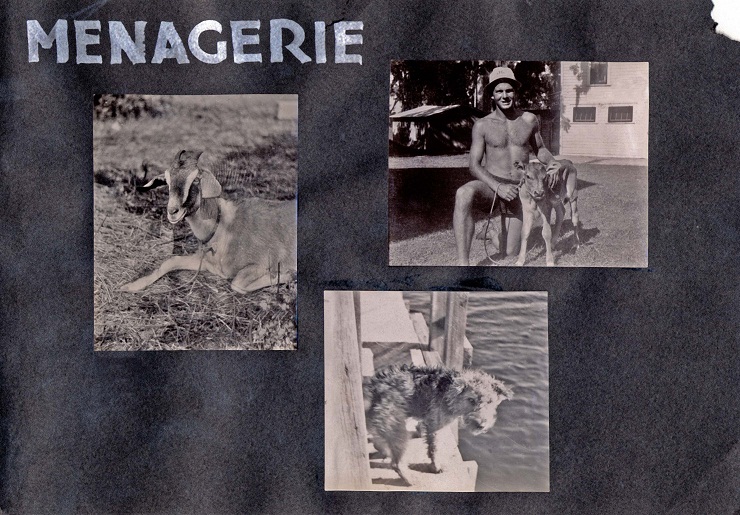 CPS Camp No. 27, subunit 4Photo album of Orlando, Florida, project, page #8. "Menagerie".Digital image from American Friends Service Committee: CPS Records (DG002), Swarthmore College Peace Collection, Swarthmore, Pennsylvania
CPS Camp No. 27, subunit 4Photo album of Orlando, Florida, project, page #8. "Menagerie".Digital image from American Friends Service Committee: CPS Records (DG002), Swarthmore College Peace Collection, Swarthmore, Pennsylvania -
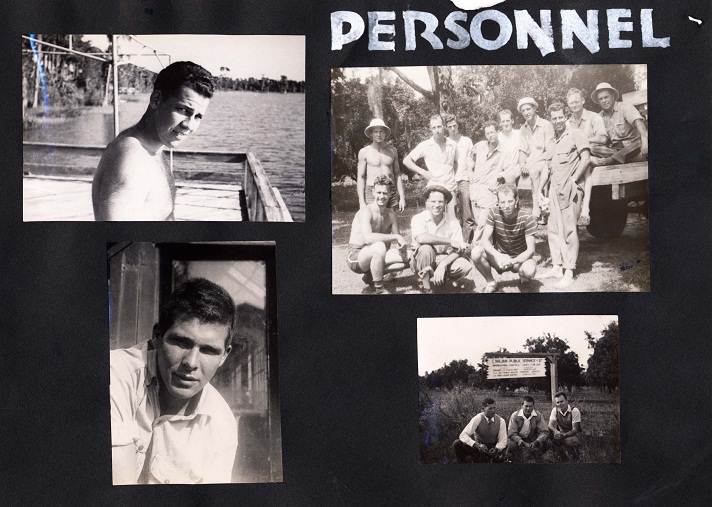 CPS Camp No. 27, subunit 4Photo album of Orlando, Florida, project, page #9. "Personnel".Digital image from American Friends Service Committee: CPS Records (DG002), Swarthmore College Peace Collection, Swarthmore, Pennsylvania
CPS Camp No. 27, subunit 4Photo album of Orlando, Florida, project, page #9. "Personnel".Digital image from American Friends Service Committee: CPS Records (DG002), Swarthmore College Peace Collection, Swarthmore, Pennsylvania -
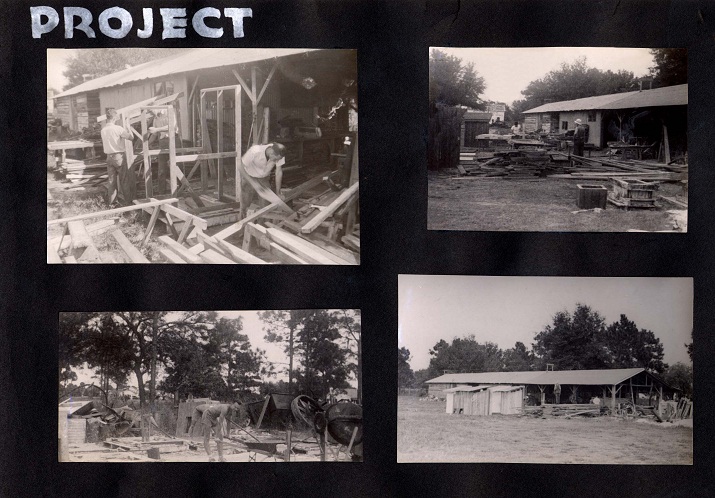 CPS Camp No. 27, subunit 4Photo album of Orlando, Florida, project, page #13. "Project".Digital image from American Friends Service Committee: CPS Records (DG002), Swarthmore College Peace Collection, Swarthmore, Pennsylvania
CPS Camp No. 27, subunit 4Photo album of Orlando, Florida, project, page #13. "Project".Digital image from American Friends Service Committee: CPS Records (DG002), Swarthmore College Peace Collection, Swarthmore, Pennsylvania -
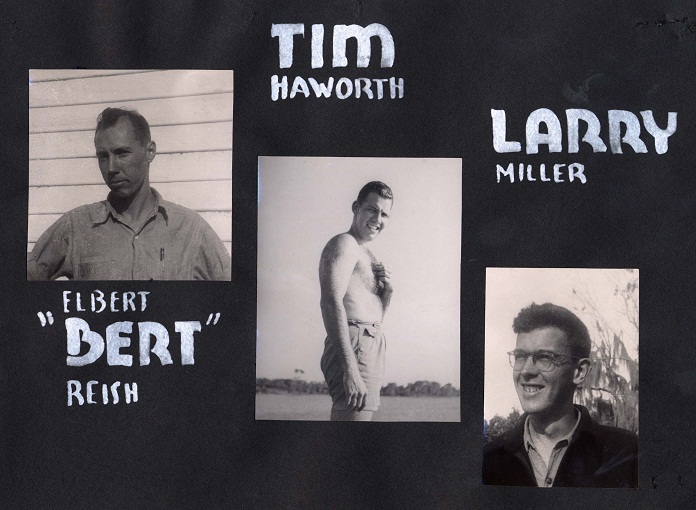 CPS Camp No. 27, subunit 4Photo album of Orlando, Florida, project, page #11. Joseph Elbert Reish, Timothy P. Haworth, Lawrence L. Miller.Digital image from American Friends Service Committee: CPS Records (DG002), Swarthmore College Peace Collection, Swarthmore, Pennsylvania
CPS Camp No. 27, subunit 4Photo album of Orlando, Florida, project, page #11. Joseph Elbert Reish, Timothy P. Haworth, Lawrence L. Miller.Digital image from American Friends Service Committee: CPS Records (DG002), Swarthmore College Peace Collection, Swarthmore, Pennsylvania -
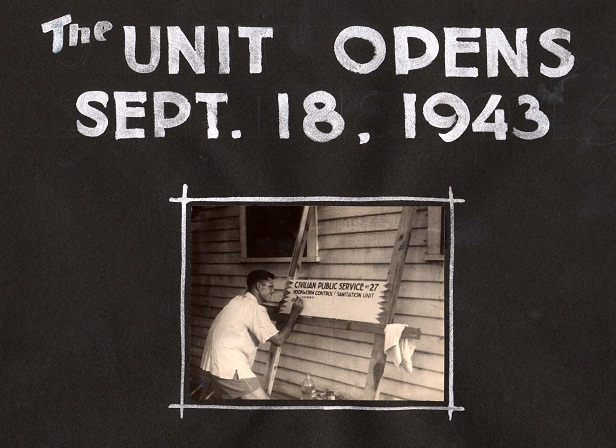 CPS Camp No. 27, subunit 4Photo album of Orlando, Florida, project, page #1. "The Unit Opens, Sept. 18, 1943".Digital image from American Friends Service Committee: CPS Records (DG002), Swarthmore College Peace Collection, Swarthmore, Pennsylvania
CPS Camp No. 27, subunit 4Photo album of Orlando, Florida, project, page #1. "The Unit Opens, Sept. 18, 1943".Digital image from American Friends Service Committee: CPS Records (DG002), Swarthmore College Peace Collection, Swarthmore, Pennsylvania -
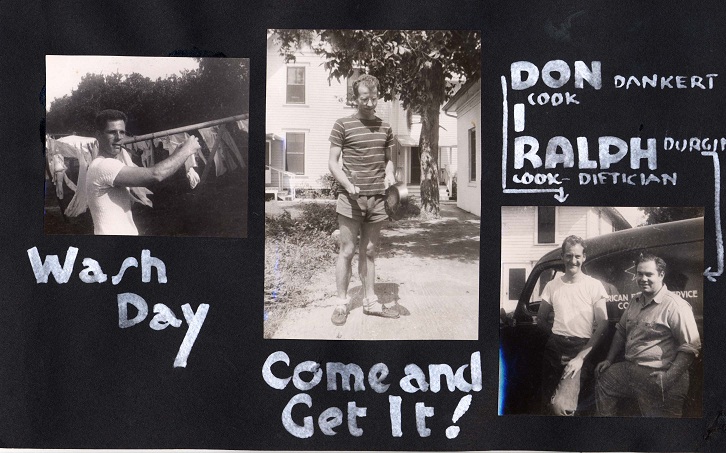 CPS Camp No. 27, subunit 4Photo album of Orlando, Florida, project, page #12. Donald A. Dankert and Ralph P. Durgin.Digital image from American Friends Service Committee: CPS Records (DG002), Swarthmore College Peace Collection, Swarthmore, Pennsylvania
CPS Camp No. 27, subunit 4Photo album of Orlando, Florida, project, page #12. Donald A. Dankert and Ralph P. Durgin.Digital image from American Friends Service Committee: CPS Records (DG002), Swarthmore College Peace Collection, Swarthmore, Pennsylvania -
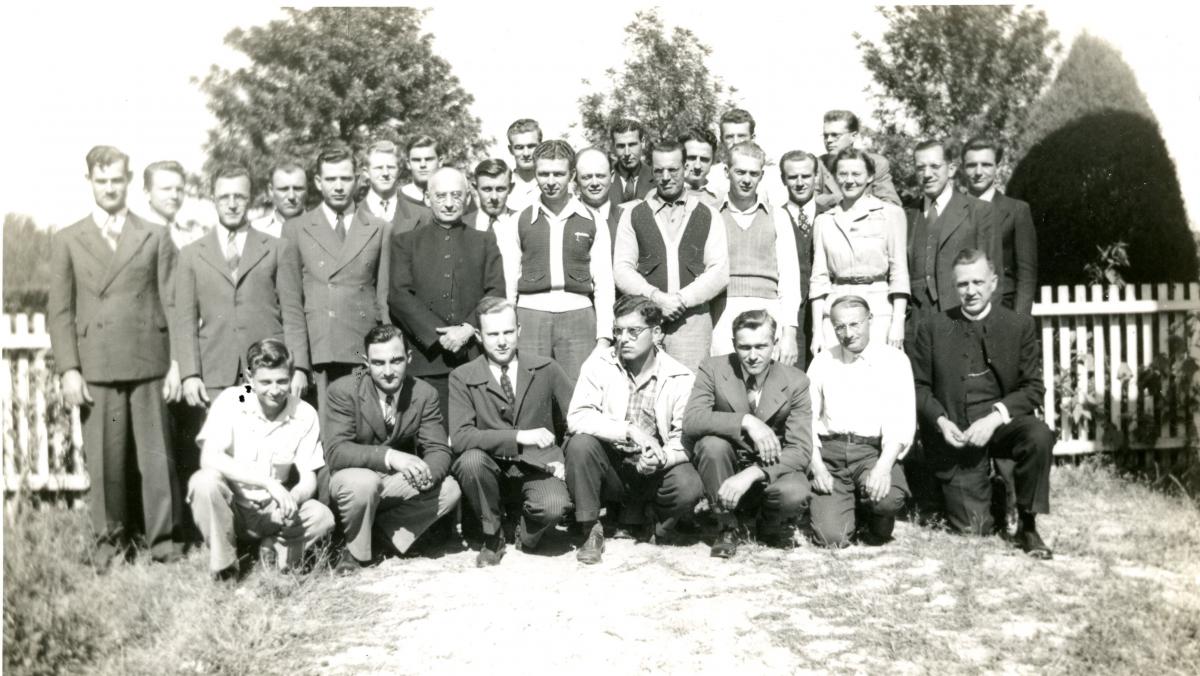 Group of conscientious objectors at CPS Camp # 27Group of conscientious objectors at Civilian Public Service Camp No. 27, Mulberry, Florida, January 1944, during World War II, with visiting ministers Ernest E. Miller and M.C. Lehman. Front row, left-right: 1. Herman Ropp, 2. George Bohrer, 3. Arthur Thiessen, 4. Ethan Horst, 5. Jacob Guhr, 6. Edwin Weaver, 7. Dr. Ernest E. Miller Back row, left-right: 1. Ernest Pankratz, 2. Harold thiessen, 3. William Yoder., 4. Delman Stahly, 5. Dennis Lehman, 6. Lester Hiebert, 7. John Horst, 8. M.C. Lehman, 9. Wesley Prieb, 10. Paul Schmidt, 11. Galen Widmeer, 12. Menno Lohrenz, 13. Willard Baer, 14. Paul Milelr, 15. Roland Bartel, 16. Ernest Shank, 17. Franklin Wiebe, 18. Roland Kauffman, 19. Leo Goertz, 20. Mrs. Harold Martin, 21. Harold Martin, 22. C. Nelson Hostetler Not on picture, but part of group: Peter Bartel, George Falb, Hugh Hostetler, Mervin Hostetler, Dwight Jacobs, Dallas Voran, Harry Weirich, Edmund Zehr, Martin Schroeder, Albert BohrerMennonite Central Committee Historical ArchivesJanuary 1944
Group of conscientious objectors at CPS Camp # 27Group of conscientious objectors at Civilian Public Service Camp No. 27, Mulberry, Florida, January 1944, during World War II, with visiting ministers Ernest E. Miller and M.C. Lehman. Front row, left-right: 1. Herman Ropp, 2. George Bohrer, 3. Arthur Thiessen, 4. Ethan Horst, 5. Jacob Guhr, 6. Edwin Weaver, 7. Dr. Ernest E. Miller Back row, left-right: 1. Ernest Pankratz, 2. Harold thiessen, 3. William Yoder., 4. Delman Stahly, 5. Dennis Lehman, 6. Lester Hiebert, 7. John Horst, 8. M.C. Lehman, 9. Wesley Prieb, 10. Paul Schmidt, 11. Galen Widmeer, 12. Menno Lohrenz, 13. Willard Baer, 14. Paul Milelr, 15. Roland Bartel, 16. Ernest Shank, 17. Franklin Wiebe, 18. Roland Kauffman, 19. Leo Goertz, 20. Mrs. Harold Martin, 21. Harold Martin, 22. C. Nelson Hostetler Not on picture, but part of group: Peter Bartel, George Falb, Hugh Hostetler, Mervin Hostetler, Dwight Jacobs, Dallas Voran, Harry Weirich, Edmund Zehr, Martin Schroeder, Albert BohrerMennonite Central Committee Historical ArchivesJanuary 1944
-
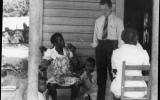
-
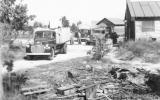 Nov. 12, 1943
Nov. 12, 1943 -
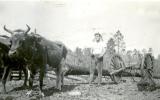
-
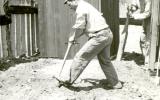
-
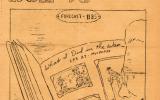
-
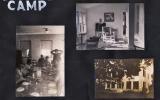
-
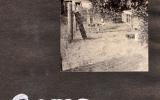
-
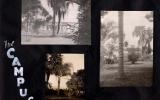
-

-
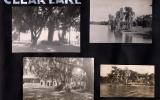
-
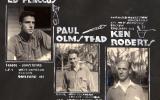
-
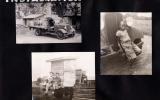
-
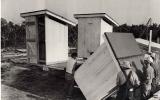
-
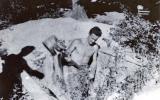
-
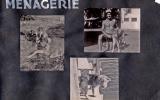
-
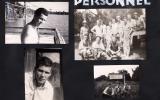
-
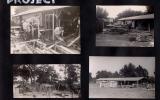
-
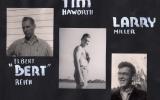
-
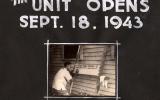
-
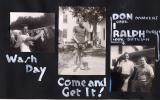
-
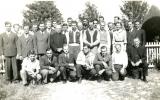 January 1944
January 1944
CPS Camp No. 27 Subunit 4 at Orlando, Florida, a public health service project operated by the American Friends Service Committee, opened in 1943 and moved to Gainesville, Florida in November 1945, as a result of local hostility to the unit. Men constructed and installed sanitary privies to prevent contamination by hookworm eggs.
The camp opened in Orlando, Florida but moved to Gainesville in November 1945 in response to local hostility.
Directors: Chris Ahrens, John McAllister
The men at American Friends Service Committee camps tended to constitute the most religiously diverse group of men, including men who upon entry into CPS reported no religious affiliation.
Few men in Friends camps entered from rural areas; many from urban areas.
They entered CPS from a variety of occupations with forty-three percent reporting technical and professional positions. Men in the Friends camps, on average had completed 14.27 years of education with nearly seventy percent having completed some college course work, graduated from college, completed graduate and postgraduate work. (Sibley and Jacob pp. 171-72)
The men constructed and installed sanitary privies to prevent soil contamination. Hookworm eggs carried in the excreta of infected persons contaminated the soil.
Committed to racial equality, the Orlando men occasionally ran into conflict with local norms of white supremacy as they tested Jim Crow laws. In May 1944, Orlando men gave a party honoring the graduating class of an African-American high school, and within two weeks, county commissioners asked for withdrawal of the unit. The officials of the public health project prevailed on the commissioners to allow the work to continue; the commissioners agreed as long as those who remained would refrain from all future “interference in the racial issue”. (Sibley and Jacob p. 159)
While five men asked for a transfer after this incident, the rest of the men also very concerned about segregation in the South, were convinced that effective action to address inequality could be taken only by those acquainted with both the experience and perspective of Southern whites and African-Americans. They realized that would require the gradual process of education. This would mean observing the color line when working with white southerners to advance the physical welfare of African-Americans and offering encouragement to self-help enterprises such as co-operative stores and credit unions.
Some of the group felt that the continuation of the public health project would benefit the African-Americans more than would the withdrawal of the unit since staying afforded the opportunity for action without strong emotional community reactions. The Assistant Executive Director of Friends CPS, Louis Schneider, interpreted to the State Health Department and local government officials the religious belief in “the brotherhood of mankind to overcome prejudices and antagonisms”.
Finally officials agreed to “reaffirm their confidence in the good judgment of the unit concerning inter-racial activities and relationships”. They required no rigid agreement for the men to refrain from interracial action. They also intended to cancel requests for transfer by four men. The four persisted to leave, however, but the rest stayed on to exercise their commitment to racial equality through a gradualist approach.
Even so, the continued local hostility did contribute to the move of the unit to Gainesville, Florida. (Goossen).
The August 5, 1944 issue of The Cultural Rag included an invitation from the Race Study Group to join them on a trip to Griffin Park, Negro USHA public housing project. Director James R. Walker would be giving a tour and holding a round table discussion. Griffin Park, designed for low income families would ask families earning over $1600 with three minor children to leave. (p. 1)
The Cultural Rag began in February 1944 and continued through February 1945. It announced events as above, reported on current and upcoming courses at the camp, new materials in the library, visitors to camp or to the area, project news, as well as news of larger issues in the CPS world.
The men published Wakulla Newsletter in October and December of 1944 and April 1945. The April 1945 issue was produced by Ray Bowman, Curtis Johnson, George Romine, Wilmer Brandt, Ford Secrist, Winfield Skinner, Jim Wingate, Jim Godbey, Harry Graybill, Lew Woodman and Charles Davis. It included a detailed discussion of the pros and cons of “Prescribed Burning” in the forests, an article “CPS vs. Jail” and reported on a stimulating visit by Dan West of the Brethren Service Committee the week of Feb. 23 through March 1. The week included discussion of the Pros and Cons of the absolutist position on conscription, relief work in Spain, the future of the hookworm project, the need to develop group discipline in CPS camps to understand breakdowns in temper control and possible redirection, and the Organized Church and the Ministry. The issue introduced the expanded work with Forest Service that was begun after the move to Gainesville.
The Cultural Rag Vol. 1 No. 3 (March 4, 1944); Vol. 1 No. 4 (March 10, 1944); Vol. 1 No. 8 (April 15, 1944); Vol. 1 No. 17 (August 5, 1944); Vol. 1 No. 24 (September 30, 1944); Vol. 1 No. 32 (December 30, 1944); Vol. 1 No. 34 (January 13, 1945) in the Swarthmore College Peace Collection, American Friends Service Committee: Civilian Public Service Records (DG002) Section 3, Box 7.
For more information on women COs see Rachel Waltner Goossen, Women Against the Good War: Conscientious Objection and Gender on the American Home Front, 1941-47. Chapel Hill, NC: The University of North Carolina Press, 1997.
For general information on CPS camps see Albert N. Keim, The CPS Story: An Illustrated History of Civilian Public Service. Intercourse, PA: Good Books 1990..
For additional information on testimony of racial brotherhood, see Mulford Q. Sibley and Philip E. Jacob, Conscription of Conscience: The American State and the Conscientious Objector, 1940-1947. Ithaca, NY: Cornell University Press, 1952, pp. 156-160.
Wakulla Newsletter (April 1945) the Swarthmore College Peace Collection, American Friends Service Committee: Civilian Public Service Records (DG002) Section 3, Box 7.
Swarthmore College Peace Collection, Camp periodicals database.